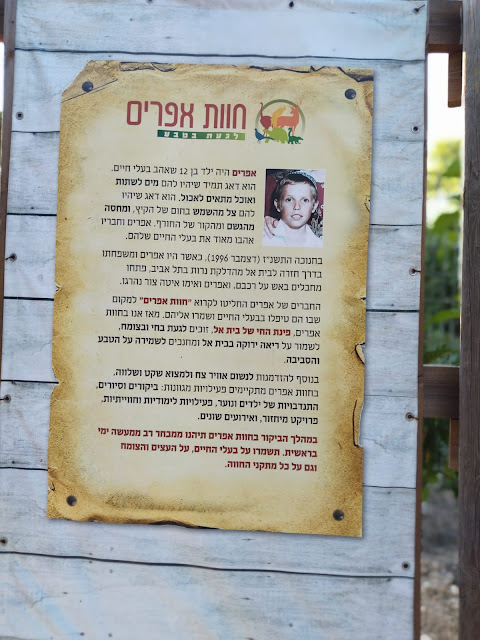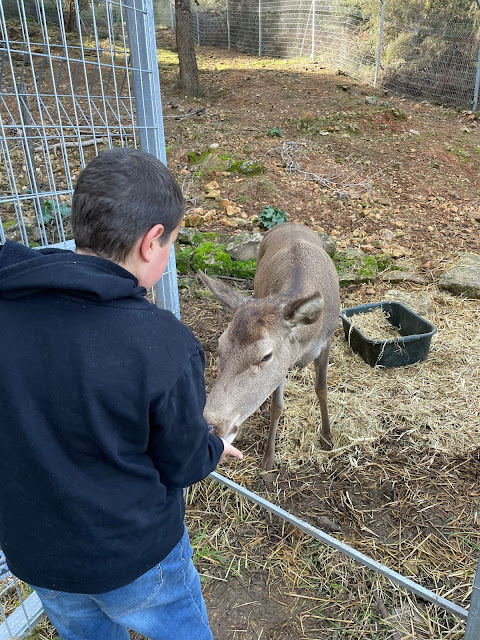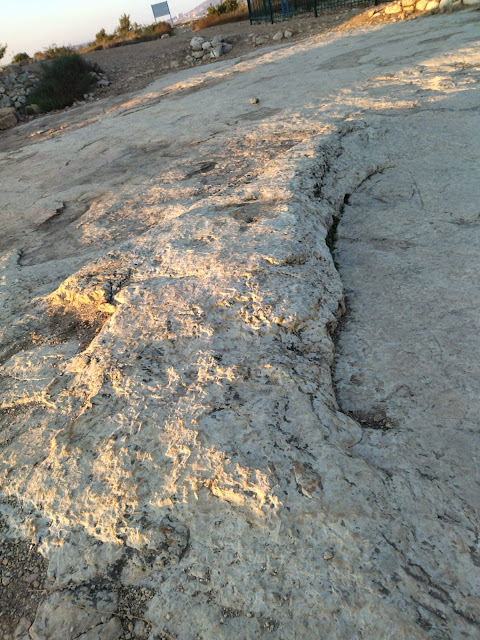Interview with Tuvia Victor of Havat Efraim
Havat Efraim, the Beit
El Children’s Zoo, comes upon one like a surprise. My friend had said “I’m
going to the petting zoo in Beit El. Do you want to come with?”
I eagerly accepted. It’s not that I cared so much about
seeing a “petting zoo” but I really, really wanted to go to Beit El. Somehow in
43 years of living in Israel, I had never managed to see this important biblical
city. Here was my chance and I was taking it with or without the animals.
It was a magical day.
Havat Efraim, or “Efraim’s Farm” is not really a “petting zoo”
(or “pinat chai” as the Hebrew-speaking locals call it), though there is a
bunny pen for this purpose. It’s a proper children’s zoo, albeit small, nestled
inside a wooded area, with numerous water features and proper benches to sit on.
Some of the animals roam free, while others are in cages, and the place just seems
to wind on and on, as you constantly come upon yet another interesting species
of animal, just around the corner.
The man who runs this impressive—and impressively-sized—children’s zoo is Tuvia Victor. It is doubtful that Victor ever expected to become a zookeeper. Born in South Africa, the
 |
| Tuvia Victor with a deer at Havat Efraim, Efraim's Farm |
Tuvia took time from his busy schedule to answer some
questions about his labor of love, Havat Efraim, Efraim’s Farm:
Varda Epstein: What event
was the inspiration for the expansion of the pinat chai? When did you become
involved?
Tuvia Victor: On the last night of Chanuka in 1996, there
was a terrorist attack and I went in the ambulance as a medic to the scene of the
attack. A family on its return from lighting candles with family was shot, and
the mother and the 12-year-old son were seriously wounded. The son died from a
head wound at the site of the attack and the mother passed away later that
night in the hospital. The Tzur family were neighbours of mine. The young boy,
Efraim, together with his friends had tendered a spot where they kept some
ducks and a goat His friends made a sign which read: “Efraim’s Farm – in memory
of our friend.” I was moved by their action and started to help them improve
and enlarge the cages which they had built. From there Efraim’s Farm grew and
grew until it became what it is today.
 |
| The story of Efraim Tzur, HY"D. Memorial plaque at Havat Efraim. |
Varda Epstein: Is
there something special about the location of the pinat chai? Why do you think
Efraim chose this spot?
Tuvia Victor: The pinat chai is located in the valley below the
settlement—I imagine that the children wanted to tend to animals but their
parents (mothers?) were not so keen for that to happen in their garden!
 |
| A boy feeds a red deer at Havat Efraim, the "pinat chai" or petting zoo of Beit El |
Varda Epstein: What
kind of animals do you have at the pinat chai today, and how many of them are
there altogether? How big a part does your location play in determining the
types of animals you bring in? How much space do you have in which to house
them all?
Tuvia Victor: We have a variety of animals – mammals, birds
and fowl, small carnivores, reptiles and fish. We house about 250 animals in
about 12 dunam. We have deer, sheep, goats,
coatimundi, horses, donkeys, peacocks, guinea fowl, a variety of ducks and
geese, Sulcata tortoises and a number of species of birds.
 |
| Sulcata tortoises |
Varda Epstein: What
does it take the feed all those animals? Is the feed delivered?
Tuvia Victor: Each animal is fed with a diet suitable to it.
We feed with hay and prepared dry feed mixtures, as well as fresh fruit and
vegetables. The community leaves leftover fruit, vegetables and bread in a
special crate built at the entrance to the pinat chai. The hay is delivered by
truck (about 8 tons) while I collect the dry food every 2 weeks.
 |
| Cameroon sheep, goats, and horses at the Pinat Chai in Beit El |
Varda Epstein: Talk
to us about the expansion. Who does the work? What kind of improvements have
you made?
Tuvia Victor: We employ any worker that needs work – over
the years we have employed unemployed, under-employed and those needing to
supplement their income. The Jewish National Fund (JNF) built the duck pond and
the caves for the farm animals. Together with the employees we spoke about
before, volunteers (both adult and children), and myself, we built the rest of
the structures. We use recycled materials wherever possible, like equipment
from children’s parks etc.
 |
| Mandarin Ducks |
The duck pond
Varda Epstein: What are some of your favorite animals at the pinat chai, and why?
Tuvia Victor: Each and every one is special to me! Naturally
when we get new animals they are the most exciting and challenging – learning
what they need in terms of feeding, housing and "entertainment". Our
latest residents are the Jacob
Sheep. Some believe that the modern breed is actually the same one
mentioned in the Bible (although there is little genetic evidence). We have two
males and are hoping to begin breeding them by bringing female ewes. Some of
them have 4 horns!
 |
| A Jacob sheep is fed a treat of lavender from a visitor |
Varda Epstein: What
can visitors expect to find on arrival at the pinat chai? Is there an entry fee?
Is there a way to visit on Shabbat?
Tuvia Victor: Efraim’s Farm is open from dawn to dusk. The
information center at the entrance offers a map of the pinat chai as well as
its story. The expected code of behavior is also displayed there. The entry fee
is 5 NIS per visitor. Entrance fee can be paid by bank transfer (Bank Leumi,
Branch 902, Account 20880098), by credit card via the website, or cash which is
fed to the stone rabbit at the entrance.
Visitors on Shabbat are requested to pay on a weekday.
 |
| Kids enjoy "feeding" this stone rabbit their 5 NIS entry fee. Me speaking bastard Yiddish nonsense to an Emu |
Varda Epstein: Do you
offer any activities for children? Is the pinat chai a safe place for them? Are
all of the animals caged?
Tuvia Victor: We welcome schools, nursery schools and groups
to visit and enjoy pita-making, a petting area, and other activities – all with
prior arrangement. We also offer animal therapy for children. Although most of
the animals are in their own areas, the smaller goats do wander around. We do
suggest parents look after their children in the pinat chai – for both their
safety and to ensure they treat the animals with the expected respect and
without hurting them.
 |
| Coatimundi at Havat Efraim, the Pinat Chai of Beit El |
Tuvia feeds the coatimundis
Varda Epstein: Tell
us more about your location. Are there other local attractions to see in Beit
El?
Tuvia Victor: Beit El is a vibrant and growing community
with about 1300 families. In
addition to visiting the pinat chai, one can walk back in history by visiting
the spot of Jacob’s dream, the remains of Jerobam’s altar, and ancient burial caves. There are restaurants, springs and parks. A
new visitors’ center is soon to be opened.
 |
| Just a rock or the rock where Jacob slept and had his dream? |
Varda Epstein: What
are your future aspirations for the pinat chai? What’s next on the agenda?
Tuvia Victor: Our next project is to complete a reptile
house which will include snakes, iguanas, lizards etc. Donations will help us
tremendously to continue employing the unemployed, providing for the animals
and improving our unique place for the benefit of all the visitors – children
and adults alike.
To make a donation to Havat
Efraim/Efraim’s Farm, and for more information, please visit the website of the
Beit El Children’s Zoo.
|
Or order from your favorite bookseller, using ISBN 9798985708424. Read all about it here! |

|



.jpeg)
























